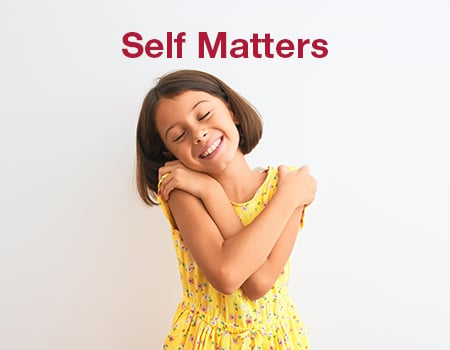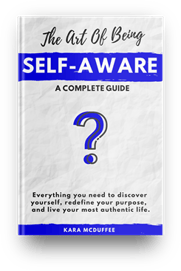We all have that person in our life who repeats the same mistakes over and over again. Whether it pertains to relationships, work, or everyday life, we can see that they’re not learning from their decisions.
It’s obvious to us that their patterns work against them. But it’s not obvious to them - and this lack of awareness isn’t a rarity.
The majority of us repeat the same patterns, even if they harm our happiness. Maybe you feel bouts of anger toward someone you love, or perhaps you find yourself in stressful situations again and again. You might procrastinate even though it doesn’t help, or neglect your body when it needs the most attention.
Or, more than likely, you don’t even realize the cycle of patterns that hold you back.
Fortunately, the more we can learn to recognize these patterns, the more we can use them as a tool.
Self-Awareness Crash Course: Established Routines and Beliefs
I want you to imagine someone walking through a park. The sidewalk stops, and they decide to take a shortcut across a grassy patch of land. As they walk, the biggest mark they’ll leave is a few bent pieces of grass. However, if more people begin to take the same path, the grass will begin to show some wear. After a lot of people walk the route, a dirt path will form.
Eventually, nobody will even question that grass used to be where there’s now a dirt path. They’ll just find themselves turning off the sidewalk and onto the new path.
Our brains work similarly. When we do something for the first time, our actions leave little impact on our brain. However, the more times we repeat something, the more ingrained it becomes in our behavior. Eventually, we don’t even recognize what we’re doing.
The decision-making process has been replaced by routined patterns. For this reason, it’s challenging to recognize our harmful patterns. We often lack the self-awareness to identify our actions because we aren’t consciously deciding to act in the first place.
Extra Challenges: Emotions and Childhood
The neural pathways we form in the brain aren’t the only reason it’s tough to recognize our patterns. Another reason is that we form patterns in our childhood. Often, we’ve been repeating the same patterns for years - and often decades.
You might be thinking, I’m an adult now. How could I possibly still be doing the same things as I did as a child?
The answer to this question brings us to our next major challenge. Emotions lay at the root of our harmful patterns. Therefore, we’re usually repeating the same emotional patterns - and they merely manifest in different forms.
For example, I seek out control in my life when I’m feeling uncertain or anxious (as do many of us, since this is a common human condition). The pattern I repeat - engaging in controlling behaviors when I feel uncertain - has looked differently over the years. At one point, it manifested through controlled eating; at other times, obsessive cleaning.
But the emotional pattern is rooted in what served me as a child.
At some point in my childhood, I developed this pattern as a way to cope with my emotions. Back then, my controlling behaviors might have been how I organized my toys or played with my friends. As I developed into an adult, the behaviors changed, but the pattern itself continued.
The deeply-rooted “issues in my tissues” can’t go away until I see them.
Your emotional pattern is probably different from mine, but the results are the same. You get locked into negative cycles with negative consequences - and you don’t know how to change.
Why It’s Important to Recognize Your Patterns
Self-awareness is all about identifying your thoughts, feelings, and behaviors in the present moment. So why worry about patterns?
Patterns can serve as invaluable clues into what we’re actually feeling. Our emotions are at the root of our behaviors, but emotions are complicated and nuanced. We often struggle to accurately name our emotions - if we can identify them at all.
Additionally, our patterned behaviors often hide what we’re really feeling. It’s easier for us to slip into our routines than to unleash the negative emotions underneath. After all, who wants to feel shame, loneliness, or fear? Our brains try to protect us with go-to patterns instead. But this doesn’t solve our problems; it merely prolongs them.
Once we learn our emotional patterns, we can tune into what’s really going on. Then, we can address the actual problem in question. Even if it’s unpleasant at first, this self-work will benefit us in the long run.
3 Steps to Recognize Your Self-Sabotaging Patterns and Use Them
1. Zoom out on your life
The problem with emotional patterns is that it’s tough to see them when we’re in them. This is the same reason other people’s patterns are obvious to us and unannounced to them. We get too bogged down in the day-to-day emotions to realize the bigger picture.
That’s why you need to zoom out on your life. Try to evaluate your life as if you’re a third-party scientist looking for evidence. You can use your life experiences as data to draw conclusions. We experience thousands of emotions and behaviors a day. However, most of these are repeated.
Journaling will be crucial for this step, as the act of putting pen to paper can help you step back.
Ask yourself:
- What negative emotions repeat themselves in your life?
- What negative behaviors repeat themselves in your life?
- What do your closest people say about you the most when it comes to negative behaviors?
2. Work to discover your emotional triggers
Our patterns may manifest themselves in different ways, but they’re usually rooted in the same underlying emotions. Even if you can’t recognize the emotions right away, you can usually identify your emotional triggers. You can use these triggers as clues to uncover what you’re really feeling.
For example, another one of my emotional patterns is that I get overly critical when I feel vulnerable. This pattern led to a lot of fights with my partner in our first few years together, because I didn’t know why I felt angry. Instead of uncovering the cause, I simply expressed my anger through my actions.
However, once I began to take inventory of what prompted my anger, I could begin to see the truth. My critical nature came out after moments of vulnerability. Now, when I feel extra critical, I look for what might be making me feel vulnerable.
Discovering your emotional triggers can help you get to your genuine emotions quicker.
Ask yourself:
- What causes a change in your emotions or behaviors?
- What different situations often prompt the same behavioral response?
- How might your negative behaviors be hiding an underlying emotional trigger?
3. Interrupt the pattern and address the emotion
Recognizing your emotional pattern and triggers doesn’t mean that they’ll immediately stop. Remember, you’re fighting against years of brain conditioning and behavioral routines. Instead, improved self-awareness will help you to interrupt the negative patterns and address the emotion itself.
Once you know your emotional patterns, you can start to identify when you begin to engage in them. In these moments, try to interrupt the pattern. Remind yourself that it isn’t serving you. Then, sit down with yourself to uncover what you’re really feeling.
From there, you can discover what you need.
Ask yourself:
- What clues can you use to recognize when you’re engaging in a negative emotional pattern?
- How can you interrupt the negative pattern and replace it with a healthier alternative?
- How can you design your environment in a way to reinforce more positive patterns?
Conclusion: Using Your Emotional Patterns
We all have negative emotional patterns, often starting in childhood and spanning for decades in our life. Rather than criticize yourself or blame these patterns, you can learn how to use them as powerful tools on your Inner Work journey.
Recognizing your emotional patterns will drastically improve your self-awareness. The more self-aware you are, the more you can begin to reclaim your life in a meaningful way.

Kara McDuffee is the writer and founder of My Question Life, a community dedicated to helping you discover yourself and find the answers you’re searching for. She gives you the questions you need to become more self-aware and vulnerable in your everyday life. To read her posts or download her free eBook The Art of Being Self-Aware, check out her blog.




Leave Comment